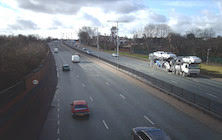
A new study has highlighted road runoff pollution as one of the main sources of damage to London’s waterways. The cause is spills of oil, diesel and petrol and particulates from tyres and brakes which are washed into waterways. Toxic metals and hydrocarbons pose a significant threat to river health, killing fish and discolouring water, in some cases, turning it black.
The River Brent in west London and the River Lea in the east are worst affected. Only one watercourse, the Carshalton Arm, source of the River Wandle, is rated as "good" under EU standards. Funded by the Greater London Authority, City Hall, Transport for London and the Environment Agency the study was carried out by Thames21 and Middlesex University.
Modelling only applied to major roads in outer London for which TfL have data around vehicle movements. This equates to nearly 40,000km, or 75% of London’s major roads.
It found that roads where heavy goods vehicles (HGVs) regularly apply their brakes are often the worst affected, around junctions, roundabouts and traffic lights. The most polluting roads identified in the study include the Junction of North Circular and Abbey Road, Alperton, the North Circular at Chingford, the slip road to the A40 by Ealing Sports Ground and Jenkins Lane, Beckton.
The study says that natural barriers, including plants and wetlands, and filters can be used to prevent run-off from reaching waterways. They can also provide habitats for wildlife. A move to electric vehicles will help to reduce the problem, but toxins from tyre wear and braking systems will remain. Better public transport can and encouraging people to walk and cycle will play a key role.
Mayor of London, Sadiq Khan, has called on the government to provide more funding to tackle the issue. It is complex because the sources of pollution are under the oversight of many bodies, including the Environment Agency, the Highways Agency, the Department for Environment, Food and Rural Affairs (Defra), the Department for Transport and local authorities, all of which face budgetary pressures.
He said: "The government must step up to provide the EA and highways authorities with the appropriate funding for measures to properly protect the capital’s rivers."
John Bryden, head of improving rivers at Thames21, said: "Pollution from roads is one of the least understood and most complex forms of river pollution. This research can finally help us identify the worst roads and start taking action to deal with this urgent problem."
A Defra spokesperson commented: "Improving our environment takes time, money and the combined effort of government, industry, businesses and civil society. We actively support this, bringing organisations together to tackle difficult issues like road runoff."
